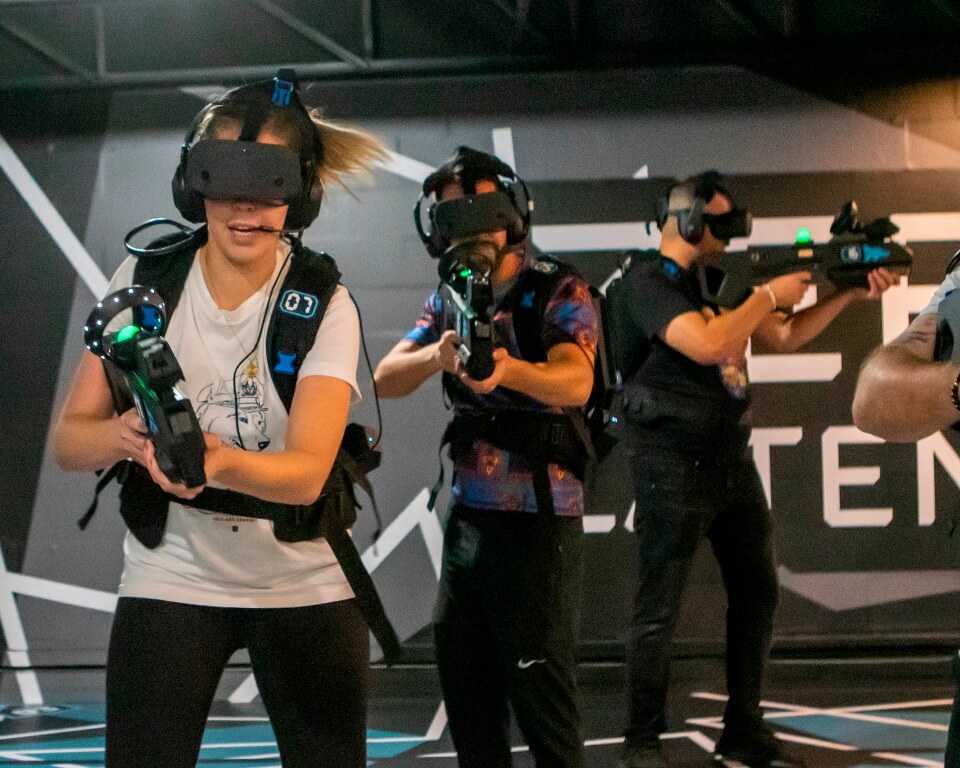Today, VR or Virtual Reality is increasingly appearing in the gaming industry – on computers, consoles and smartphones. Could this be the future of video games?
Virtual reality (VR) allows a person to immerse and project themselves in a space very close to reality – but not quite reality! The development of these VR headsets had led to the birth of a new world of gaming. Oculus Rift, HTC Vive and Playstation VR are among the VR headsets that are invading the shelves of major retail stores.
In recent years, virtual reality has become increasingly important to the world of video games.
The idea of going into a virtual world to escape reality is not new. Indeed, in 1957, filmmaker Morton Heilig imagined a machine, the “Sensorama”, which would allow the user to immerse themselves into a fantasy world. In 1968, Ivan Sutherland also developed a virtual reality headset. For his part, the helmet of this American computer engineer allowed him to see various simple shapes stacked in a real environment. In 1991, a virtual reality headset for games was also created thanks to Sega, and we can’t forget to mention Nintendo’s first VR headset, released in 1995.
How Virtual Reality Transforms Games
While VR experiences will never completely replace other forms of entertainment, it has made the gaming industry more inclusive and consumer-friendly.
With various restrictions related to Covid-19, people are spending more money on entertainment. This is particularly relevant in the video game industry.
Thanks to state-of-the-art technologies, the gaming market has become increasingly popular due to virtual reality-based entertainment.
What Benefits Can Virtual Reality bring to Games?
Most computer games can be successfully converted to VR, and offer a new and more exciting interaction, which also increases user engagement.
VR games are more appealing to both seasoned and casual players with a more immersive experience. Players are more involved in virtual reality because they have a number of “tools” that make it easier to get started, including controllers and headsets. These advanced features enrich the gaming environment, especially when compared to playing games on a flat screen.
The release of new controllers has become a turning point in the construction of a player’s interaction with the VR environment. Players can now control the game environment as they see fit. In the near future, we can predict that virtual reality will evolve from simply wearing a headset for visualization, to a truly immersive experience that integrates all human senses.
VR technology is a new stimulant for creating game content. Genres such as First Person Shooter (FPS), Adventure and Simulation have changed thanks to the implementation of virtual reality. Adventure and racing games are currently the most popular types of VR games, since they are so similar to reality, yet they are a touch more exciting.
All games using virtual reality offer players a 3D experience. As we know how popular and sought after this technology is in the gaming industry, we understand why players are looking for it so much. Casino fans also love this technology as it allows them to play remotely and feel like they are in the physical environment where the game is being played, while avoiding interaction with others, and the resulting discomfort.
This technology is intended to be scalable; the latest games released have the advantage of being very well designed with multiple features that older devices do not have. Virtual reality is relatively new and adapts perfectly to these games, even the most complex and imposing in terms of technical characteristics.
Beginnings
PlayStation has become a leader in the virtual reality space, since they are able to offer the best experiences of the market in this new space. They have been able to hook the public by using licenses that are extremely familiar to them. We saw it in the negotiations that led to the release of Resident Evil VII, only available in VR on PS4, or Iron Man and Blood and Truths VR. However, Sony is not alone; even Valve, which has not developed games for years, has chosen to reinstate its legendary Half Life license on these headphones with the Half Life Alyx. EA, while cautious about investing in new platforms, started with Star Wars Squadrons, as an independent AAA studio like IO Interactive, and also tested the limits of the platform with Hitman 3. In addition to the familiar names, the new gaming space has brought innovative independent players, as Beat Saber testifies. This is just the beginning!
So, Can Virtual Reality Replace The Gaming World As We Know It?
Yes and no. Of course, immersive virtual reality will bring a whole new experience to the gaming world – there is no doubt about that. However, some games may not be fully adapted to this platform. For example, sports games like FIFA can lose a part of their community because, let’s face it, some players just don’t have the physical performance to do everything that needs to be done on the field. Not to mention the fact that the level of the game will have to be adapted to different physical levels, and it will certainly be complicated to manage. However, other games are very likely to adapt to this new technology.
Conclusion
VR games take innovation to the next level. The ideas implemented in virtual reality games are fascinating and amazing in every sense of the word. The advancement of VR technology has created new opportunities to improve player connectivity and immersion.
Most video games still have a long way to go until they are fully converted to virtual reality, but one can reasonably predict that this technology will one day become mainstream.



